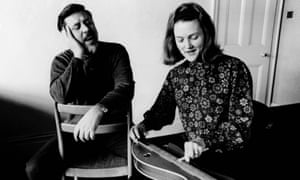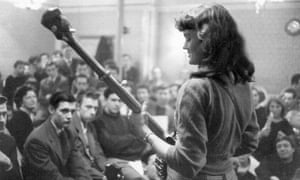
First Time Ever by Peggy Seeger – a memoir of folk royalty,She was from the American music establishment, he was born of Scottish socialism, and their love led to the 20th century’s most beautiful ballad

Peggy Seeger with Ewan MacColl at home in Beckenham, south-east London, in 1965. Photograph: Brian Shuel/Redferns
The song “The First Time Ever I Saw Your Face”, written in 1957 by Ewan MacColl, son of working-class Scottish socialists, for Peggy Seeger, an American 20 years younger than him and a self-proclaimed “spoiled middle-class girl”, is one of the most beautiful love ballads of the 20th century.
Seeger’s description of how they fell in love is far from starry or sweet. He had, she recalls, a “hairy, fat, naked belly poking out, and was clad in ill-fitting trousers, suspenders, no shirt, a ragged jacket and a filthy lid of stovepipe hat aslant like a garbage can.” On their first night together he couldn’t get it up. The second time round there was time for a quickie. “I was discomfited but compliant.”
MacColl’s father was an iron-moulder with crippling asthma. His psoriatic mother worked 16 hours a day as a charlady. She had two late miscarriages and opened a penny-a-week burial insurance policy for her other children. Seeger, by contrast, came from folk royalty. Her mother, Ruth, was the first woman to win a Guggenheim fellowship for composition; her father, Charles, was a pioneering musicologist. Regular house guests included Woody Guthrie, who once brought with him, fresh out of jail, blues singer Lead Belly. Songwriter Elizabeth Cotten, who discovered a young Peggy lost in a department store, became a housekeeper, was befriended by her brother Mike, and was lured back on to the stage after a gap of 25 years.
Though she kept a diary, her most vivid memories owe less to notetaking than they do to her eye for telling details
Though Seeger has kept a diary for much of her life, her most vivid memories owe less to notetaking than they do to her eye for telling and exuberantly recalled details. In the Vermont of her youth, she writes of “moonlight caught in the xylophone of icicles on the cabin’s overhang”. Her mother “wore a stiff girdle which creaked if you hugged her”. Her overly traditional music teacher at school played the piano with theatrical flourishes she found embarrassing: “Slow has got to be soupy; fast has got to be like little mice gone mad on a wedge of cheese.” Most striking is her description of how MacColl devoured books “much as a whale sieves krill through its baleen comb”.
The song “The First Time Ever I Saw Your Face”, written in 1957 by Ewan MacColl, son of working-class Scottish socialists, for Peggy Seeger, an American 20 years younger than him and a self-proclaimed “spoiled middle-class girl”, is one of the most beautiful love ballads of the 20th century.
Seeger’s description of how they fell in love is far from starry or sweet. He had, she recalls, a “hairy, fat, naked belly poking out, and was clad in ill-fitting trousers, suspenders, no shirt, a ragged jacket and a filthy lid of stovepipe hat aslant like a garbage can.” On their first night together he couldn’t get it up. The second time round there was time for a quickie. “I was discomfited but compliant.”
MacColl’s father was an iron-moulder with crippling asthma. His psoriatic mother worked 16 hours a day as a charlady. She had two late miscarriages and opened a penny-a-week burial insurance policy for her other children. Seeger, by contrast, came from folk royalty. Her mother, Ruth, was the first woman to win a Guggenheim fellowship for composition; her father, Charles, was a pioneering musicologist. Regular house guests included Woody Guthrie, who once brought with him, fresh out of jail, blues singer Lead Belly. Songwriter Elizabeth Cotten, who discovered a young Peggy lost in a department store, became a housekeeper, was befriended by her brother Mike, and was lured back on to the stage after a gap of 25 years.
Though she kept a diary, her most vivid memories owe less to notetaking than they do to her eye for telling details
Though Seeger has kept a diary for much of her life, her most vivid memories owe less to notetaking than they do to her eye for telling and exuberantly recalled details. In the Vermont of her youth, she writes of “moonlight caught in the xylophone of icicles on the cabin’s overhang”. Her mother “wore a stiff girdle which creaked if you hugged her”. Her overly traditional music teacher at school played the piano with theatrical flourishes she found embarrassing: “Slow has got to be soupy; fast has got to be like little mice gone mad on a wedge of cheese.” Most striking is her description of how MacColl devoured books “much as a whale sieves krill through its baleen comb”.

Peggy Seeger performing at the Enterprise pub in Covent Garden, London, in the late 1950s-early 1960s. Photograph: Alamy
Seeger rarely goes easy on herself. She tells of how she was a “lolloping, spontaneous loner” as a teenager, and would flirt with houseguests such as folklorist Alan Lomax or the radical German composer Hanns Eisler. The latter, by then a balding 50-year-old, rebuked her: “You’re doing that on purpose, aren’t you? Don’t.” Of Charles Parker, the BBC producer with whom she and MacColl created the landmark Radio Ballads series from 1958 to 1964, she says:“His ascetic face bore such a look of longing that I nearly invited him into the bed for comfort.” It’s painful to read of her later days with the sick and ailing MacColl, whom she loves, while also arranging trysts with her female lover.
Their times together were rarely smooth. Her social milieu had been assaulted by McCarthyism. MacColl had previous wives and children. Until the royalties started coming in from soul singer Roberta Flack’s cover version of “The First Time Ever I Saw Your Face”, they barely scraped by. Life on the road – popping Dexedrine pills to stay awake, having disgruntled patrons pour beer over her head – is both arduous and addictive.
Seeger and MacColl held fastidious, almost spartist beliefs about what was or wasn’t real folk music. You don’t have to be an anything-goes postmodernist to discern a trace of passport control in her boast that she can “easily spot a decayed version, a rogue word or an ill-fitting melody in print or performance”. This kind of sectarianism inspired one Lancashire folk club to forbid the singing of Yorkshire songs.
These days she readily admits to having doctored, pruned and tinkered around with traditional tunes, and even calls out her “vociferous and hypocritical purisms”, but claims that “we believed we were sticking as faithfully as possible to the style and intent of the original makers and carriers of the songs”.
Equally, in an age when anyone wielding an acoustic guitar or sporting a long weekend’s facial topiary is said to belong to some new-folk movement, it’s moving to hear Seeger evoke, in profound and felt fashion, her relationship to history: “On stage, I become as the narrow neck of an hourglass, bringing stories and singers from the past to the present; a relay runner hoping that someone will take the song from me and carry it into the future.” These songs she likens to “human nutrition”, to “a community”.
At a time when digital hustlers burble forth about disruption and accelerated obsolescence, it’s all the more wonderful to read Seeger write about tenderness and tenacity, value and vitality, culture and continuity, about folk music being “like a cardiograph: the form being the graph paper and the content the heartbeat”.
Seeger rarely goes easy on herself. She tells of how she was a “lolloping, spontaneous loner” as a teenager, and would flirt with houseguests such as folklorist Alan Lomax or the radical German composer Hanns Eisler. The latter, by then a balding 50-year-old, rebuked her: “You’re doing that on purpose, aren’t you? Don’t.” Of Charles Parker, the BBC producer with whom she and MacColl created the landmark Radio Ballads series from 1958 to 1964, she says:“His ascetic face bore such a look of longing that I nearly invited him into the bed for comfort.” It’s painful to read of her later days with the sick and ailing MacColl, whom she loves, while also arranging trysts with her female lover.
Their times together were rarely smooth. Her social milieu had been assaulted by McCarthyism. MacColl had previous wives and children. Until the royalties started coming in from soul singer Roberta Flack’s cover version of “The First Time Ever I Saw Your Face”, they barely scraped by. Life on the road – popping Dexedrine pills to stay awake, having disgruntled patrons pour beer over her head – is both arduous and addictive.
Seeger and MacColl held fastidious, almost spartist beliefs about what was or wasn’t real folk music. You don’t have to be an anything-goes postmodernist to discern a trace of passport control in her boast that she can “easily spot a decayed version, a rogue word or an ill-fitting melody in print or performance”. This kind of sectarianism inspired one Lancashire folk club to forbid the singing of Yorkshire songs.
These days she readily admits to having doctored, pruned and tinkered around with traditional tunes, and even calls out her “vociferous and hypocritical purisms”, but claims that “we believed we were sticking as faithfully as possible to the style and intent of the original makers and carriers of the songs”.
Equally, in an age when anyone wielding an acoustic guitar or sporting a long weekend’s facial topiary is said to belong to some new-folk movement, it’s moving to hear Seeger evoke, in profound and felt fashion, her relationship to history: “On stage, I become as the narrow neck of an hourglass, bringing stories and singers from the past to the present; a relay runner hoping that someone will take the song from me and carry it into the future.” These songs she likens to “human nutrition”, to “a community”.
At a time when digital hustlers burble forth about disruption and accelerated obsolescence, it’s all the more wonderful to read Seeger write about tenderness and tenacity, value and vitality, culture and continuity, about folk music being “like a cardiograph: the form being the graph paper and the content the heartbeat”.
No comments:
Post a Comment